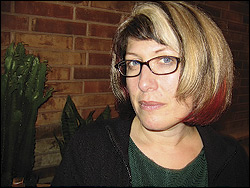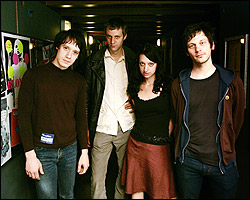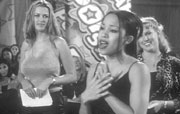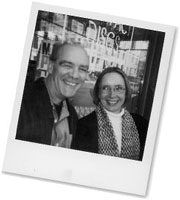Seattle-by-way-of-San-Francisco writer and musician Carla DeSantis started Rockrgrl magazine in 1994, after having had enough of music magazines that make women out to be little more than attractive accessories. Focusing on smart women making smart music and smart choices—and jettisoning beauty tips and fashion advice in favor of tips on effects pedals and advice about audio recording, Rockrgrl provided a bimonthly meeting place for female musicians and their fans. In 2000, DeSantis and the magazine staged their first conference; the second will take place Nov. 10–12 in various venues around town. Though the magazine proper’s final issue will appear around the time of the event, the Rockrgrl brand remains strong, with DeSantis an in-demand public speaker. Amidst the madness of the conference’s final preparation days, DeSantis took time off to sit for the Jukebox at my dining-room table.
Concrete Blonde: “Joey” (1990) from Bloodletting (IRS)
Carla DeSantis: Johnette!
Seattle Weekly: I know Johnette Napolitano, Concrete Blonde’s singer-guitarist, has written a lot for the magazine. I have to say, I read that story she wrote recently about singing so hard it forced her tampon out, but I’m not quite sure I believe all that. . . .
DeSantis: I do! It must have been a hell of a high note, huh? Johnette’s been sort of a guardian angel to Rockrgrl since the beginning, and when I first started the magazine—[distracted by music] that’s such a great voice—she was one of the first people to buy an ad. The record label would not buy an ad, so she paid for one out of her own pocket. So she’s always been sort of a patron saint. She was on the cover of the second issue, with her Chihuahua. She’s somebody who has been a champion of the magazine, so she wrote that tampon thing and said, “I don’t know where else to send it, so I’m sending it to you.” And I kind of went, “This is crazy, but OK.” I really like her; she’s fun and she’s cool and her heart is so in the right place. So I think she is going to have a lot to say. If anything, going just one hour with Johnette, that will be the tricky part.
SW: Right, she’s a keynote speaker for this year’s conference. What’s the angle for her speech going to be?
DeSantis: I think she’s just really going to talk about what it’s been like for her. She’s been a bandleader, she was on IRS records. That is really the whole crux of what the conference is about, for people to talk about their stories and be inspiring and cautionary simultaneously. When I was putting this together I asked her to be a part of it, but I hadn’t really asked her to be a keynote speaker because, you know, when you know people—I can’t say that I know her really well, that’s so presumptuous to say—but then I realized that she had so much to say. She’s had a really interesting career, with people leaving in the middle of tours, and she’s been the chief songwriter all along.
SW: Yeah, she’s the girl in a band of guys.
DeSantis: But she’s kind of held her own, and I think she’s one of these artists that no one ever looked and said, “Chick in band.” She’s always just been Johnette. I don’t think she’s ever been identified in that way, which is interesting, and neither has Patti [Smith]. They’ve never been identified as chick rockers or whatever that horrendous thing that [role] is.
Hole: “Doll Parts” (1994) from Live Through This (DGC)
DeSantis: I’ll name this song in one note.
SW: Tell me the Courtney Love story from the 2000 conference, when she just kind of showed up. You guys are friends or you were friends?
DeSantis: Well, that implies reciprocity. . . . I’ve known her for a long time, and I do have to admit that when Kurt died I was really fascinated by how so many young girls identified with her and how she was the bad girl in a dress. We didn’t have bad girls in dresses before Courtney. And I also personally felt the need to defend her because my feminist buttons were all pushed when, you know, Courtney was supposedly responsible for everything bad that happened to Kurt. That made me crazy: He was so wonderful and she was so horrible. Now, I’m not saying that he’s horrible and she’s wonderful by any stretch of the imagination, but . . .
SW: You object to the easy answer.
DeSantis: Right. The easy answer is, she made him do it or she pushed him to it. And that just offends me to my very core. And you know, Live Through This is my divorce album. It’s a fantastic album. So I felt the need to defend her on a lot of levels. There have been a lot of times when she has not been defendable, but man, at the conference she was amazing. I guess she had talked to [journalist] Ann Powers, and Ann had talked her into coming up. So she called the Wednesday before and wanted a list of journalists that were coming and the questions they would ask and everything else.
SW: So you didn’t ask her to come, she told you she was gonna be there.
DeSantis: Yes, she said, “I’m coming, what do you want me to do?” This was the day before she got there. We already had everything in place so it was unannounced, which was really great. So people were coming because they were coming, and Courtney was extra.
Britney Spears: “. . . Baby One More Time” (1999) from . . . Baby One More Time (Jive)
DeSantis: Ack! Britney Spears!
SW: I know that the Rolling Stone piece you did on the Marilyn Manson/Hole shows ended up being in the issue with Britney on the cover.
DeSantis: [That was the only time] I’ve ever written for them, and when I was asked, of course, I was completely flattered. But my first reaction was, “Well, I’m not going to do this if you put a naked girl on the cover.” Then I thought, “Oh, just shut up and do it.” And then, of course, it ends up being Britney’s first cover with the Teletubby, but then we also had the bug [announcement] on the cover that said “Marilyn Manson/Hole Madness.” So I haven’t been asked back since, and that’s fine with me. It’s kind of like being in cahoots with the devil. My career has been to rail against a lot of what Rolling Stone does, so I have no business being there anyway.
SW: It’s sort of like divine justice crossed with terrible irony that you got in there the way you did, writing about Courtney and Marilyn—but then with Britney Spears on the cover. It just proves your point, or at least illustrates it.
DeSantis: Exactly. And this was all going on in 2000 when Courtney came and spoke. I can’t believe, honest to God, that Britney is still a celebrity. Courtney spoke at length about her celebrity and how, in the pop world, you’re not supposed to write your own songs and there’s not this idea of selling out. But of course in the rock world, and in Seattle, more than four records is selling out.
SW: And don’t sing anyone else’s song, and don’t let your husband write a bridge for you or anything.
DeSantis: Yeah, don’t ever let Billy Corgan help you out, or anyone else. And that’s another thing that offends me as far as Courtney goes. Not only did she kill Kurt Cobain, according to popular consensus, but she can’t write her own songs, she can’t write her own lyrics. I mean, those lyrics are so her. So those are just the kinds of things that make me jump up on my soapbox.
Heart: “Crazy on You” (1976) from Dreamboat Annie (Capitol)
DeSantis: Nancy Wilson’s guitar part. This was my first favorite band. Dreamboat Annie for me was really a critical album. As far as I knew, before I moved to Seattle, there were the Wilson sisters, coffee, and [’60s sitcom] Here Come the Brides. That’s all I knew.
SW: What do you remember from Heart and this era as far as the stigma of being a woman in rock?
DeSantis: I don’t remember them being called “women in rock.” It wasn’t a big deal. There wasn’t a big deal about women playing music until MTV came into play and then image became much more important than music—for women at least. For men to a certain degree, too, but especially for women. But this album just slayed me. And of course it was my first year in college, so, you know, “Magic Man” was a signature song.
SW: Both Ann and Nancy will be there this year?
DeSantis: Ann’s going to be at the conference this year; she and Bonnie Raitt are interviewing each other, which I think will be a lot of fun. They’re going to just really have a chat about what they’ve been through. It’s pretty obvious that those two women have a lot of women fans, and that’s always a really interesting thing to look at when you’re looking at bands. I put the Donnas on the cover one time, and I thought lots of women would buy the issue but it turned out to be mostly men. There are some women that have a very male fan base, and then other times you see more women in the crowd, and Heart definitely has a huge female base for whatever reason. I think for female artists in particular, everyone always expects them to give other female artists as their influence, and that’s not always the case. I think when you see a woman doing it you become more convinced that there’s the possibility. But Heart, for example, their influences were Led Zeppelin and the Beatles.
Ronnie Spector: “Don’t Worry Baby” (1999) from She Talks to Rainbows (Kill Rock Stars)
DeSantis: Oh, it’s Ronnie. Brian Wilson wrote this for her to sing, but Phil wouldn’t allow her to record it. Her voice is so incredible, and people don’t even realize that Joey Ramone’s voice is completely inspired by her. How many people were emulating Ronnie, male and female? It wasn’t until ’99 or 2000 that she did this recording, which she did with Joey—he produced it, for Kill Rock Stars.
SW:She’s big for you, right? I know she was the keynote speaker at the last conference, and I know you personally have a big girl-group thing.
DeSantis: Oh, yeah. The girl groups are my favorite, that’s really my favorite era. You know, Kennedy was shot and that was the end of the innocence for the country, but before that it was just like, “I saw him across the room and I knew I wanted to be his bride,” and all that. Those were simpler times. It doesn’t mean that the pathos that we have today didn’t exist, but it was just simpler. I love the simplicity of these songs, the melodies and the harmonies.
SW: But what does your feminist sense say about those kinds of songs, that idea that, yeah, I saw him across the room and that was it, I had everything I ever needed in that one man.
DeSantis: I just think it’s idealistic. We’ve lost a lot of idealism. I mean, everybody wants love, even if you end up getting mad at the person you’re in love with. There’s a place for this kind of stuff, and I probably love it because it’s so opposite from my reality. I just covet the simplicity of a bygone era. I’ve completely romanticized this era. I was in bands that did girl-group stuff in prom dresses and bouffant wigs and stuff like that, but we all played so we weren’t all just singing, we were playing all the time. You know also, the thing about Ronnie is that here was this innocent “Be My Baby” thing, and she was living in hell with Phil. So those layers are just really fascinating.
Bonnie Raitt: “Give It Up or Let It Go” (1972) from Give It Up (Warner Bros.)
DeSantis: Pre-Grammy Bonnie. Bonnie Raitt when she was Bonnie Raitt and not Bonnie.
SW:She’ll be at the conference, but I know she’s also one of your favorite guitar players.
DeSantis: It’s more that she’s a slide player, and there aren’t a lot of female slide players. She was mining that territory her whole career. I mean, the fact that she eventually got a Grammy and became this grande dame, she was doing this for a long time before she got the appreciation she eventually got. I can’t say she was toiling in obscurity, but she was out there working hard before people really caught on. She wasn’t an overnight success. And again, today, where do you find an opportunity for artists to put out as many records as she put out before she had a Grammy? What major label would put out five or six records by an artist? They’d drop them after six weeks. I sound like, “Back in my day . . . ,” but I mean, I don’t think that things were so great then and I don’t think they’re better now. They are in some ways; with the underground and in indie rock, there are zillions of female artists, and people don’t really feel like they have to get a record deal anymore because there aren’t any to get and labels don’t have that much to offer.
Patti Smith: “Rock and Roll Nigger” (1978) from Easter (Arista)
SW:Tell me how Patti Smith ended up coming to the conference. She’s performing this year, she’s getting the Women of Valour award, and she’s a keynote speaker.
DeSantis: Well, I had an advisory board, and we were kicking around different people to invite and different people we wanted to come. I knew [Smith’s] attorney, Rosemary Carroll, and I called her up and said, “We’d like to give Patti a lifetime achievement award.” Her assistant called me back and said, “Well, we’re sorry, but Patti is unable to do this.” The next day, Rosemary calls me and leaves me a message— I saved it of course: “Carla, this is Rosemary Carroll, and usually she turns these things down, but we were having lunch and she wants to do it.” When those things happen, you just kind of go, “No way. Is this really happening?” So there were different moments when it seemed real, one being when Patti actually called me about something, and I was trying to be very cool and calm and collected and I could tell that my voice had gone up about five octaves ’cause I was so nervous. I was squeaking. She was really nice and really great, and when I spoke to her, she had said she was really honored to get this and it really meant a lot to her. It’s cool—since I started Rockrgrl 11 years ago, there are several people whose names always come up when you ask women why they started playing music. And Patti’s name comes up more often than many, many people’s, and it’s obvious that she’s had so much influence on people.
One of the things that I’ve always said is that there are a handful of people that [were] big in a certain era, they would never get signed now. I just always wonder, where’s the next Patti Smith? Are we ever going to have another Patti Smith? Of course she’s wonderful and unique, but you wonder if a woman who writes poetry and kind of rants and has an unusual voice—she’s not going to be an American Idol winner. You hear about Patti Smith and as much as people admire her, then they talk about armpit hair. People bring things down to the lowest, most ridiculous common denominator, especially for women. I mean, you look at great artists, and they’re sort of deconstructed for whatever reason, or they’re laughed at.
We’re lucky; we live in Seattle, where there are so many amazing, great women. We have so many great role models, and we’re sitting here living between Lilith Fair and Riot Grrrl. We’re sort of in the center of that, and a lot of places don’t have that. And that is why I think that [the conference] is an important event to do and to bring people from other parts of the country and the world to see the kind of community that we have, because we have an incredible community of women in this town, we really do. We’re doing a community-building panel, too—how do you create community out of nothing; how do you create your own MySpace in your own town?
SW:You’ll have the original Ladies Who Lunch mailing-list ladies I guess?
DeSantis: Oh yeah, Kyla [Fairchild] is on there, Shannon Roach is on there.
The Runaways: “Cherry Bomb” (1976) from The Runaways (Touchwood)
DeSantis: The Ramones? Oh, it’s the Runaways. I was wondering if there would be a Joan Jett thing in here.
I have a story about the Runaways—kind of. Kathy Valentine from the Go-Go’s is coming. She’s performing and she’s going to be on a rock mom panel. In the early ’80s, I was a bass player, and of course Kathy Valentine was the patron saint of me, and Jane Wiedlin had quit the band and I heard they were looking for bass players. So I got on the plane with my clear plastic 8-inch heels and my striped outfit and went to L.A. because I was going to be the next Go-Go. I walked into their management company and said I’m here to audition. They were like, “No, you need to send in an audition tape.” Needless to say, they hired someone else and did one gig in Brazil and then broke up. So I had to tell Kathy that story when I talked to her, and she said, “Well, you know what? I did the same thing with the Runaways. They were looking for a bass player, and I called them up.” She said that [manager] Kim Fowley was basically asking her about her sexual preferences and being about as disgusting as he can be, so she just thought, well, maybe I don’t want to do this. But I thought, wow, another thing I have in common with Kathy Valentine besides nothing.
My [cell phone] ringtone is [Jett’s] “Bad Reputation.” I think Joan’s an amazing person. She was one of the first people I heard speak about how differently she had been treated. She said she was called a whore just because she wanted to play guitar. I still don’t get why people are so threatened by the idea of girls playing guitar, or why they think it’s a novelty or it’s cute. Women are brain surgeons and attorneys. Three chords are a lot easier to learn than getting through law school. But then you take a look at the magazines that are gear oriented, or at Maxim or Blender, and you kinda go, “Hmm. Maybe they don’t want me to be part of this club.” And I mean, none of this applies to the underground; this doesn’t apply to the Pitchfork world, or to K or Kill Rock Stars or whatever. But bands in those scenes don’t get on the Billboard Top 20. I mean, a Le Tigre show versus a Britney show? It’s depressing.
Rilo Kiley: “Science vs. Romance” (2000) from Take Offs and Landings (Barsuk)
DeSantis: I love this band, I just interviewed Jenny [Lewis]. She’s going to do her solo record; she’s got so much going on.
SW:And she’s on the cover of the current issue, which is actually the last Rockrgrl issue. After 11 years, you’ve decided to end the magazine. What other things are you going to be doing now?
DeSantis: There are a couple of books I want to work on—definitely Rockrgrl topics. And I also want to lecture. I want to go to schools and talk to girls who think that maybe they’re going crazy and tell them that they’re not. One of the things that we do at the conference is that we have all kinds of panels, exposing girls to different aspects of the music community. We talk about, how do you buy your first drum kit? All that stuff. Same thing with engineers and live sound engineers, mixers: We ask them, “What made you want to do that and what’s it like for you; usually, you’re one of only a few women in the room. What’s that like?”
SW:With female producers especially, you can count them on half a hand.
DeSantis: The panel we have for that is stellar. Leslie Ann Jones, who’s the daughter of [legendary musical comedian] Spike Jones; Andrea Weatherhead, who designed EMP’s Sound Lab; and this woman named Terry Winston who started this thing called Women’s Audio Mission in San Francisco.
SW:All that stuff is so important. But with the magazine ending, that doesn’t mean the conferences will end. In fact, you want to continue doing the conferences yearly now, is that right?
DeSantis: I do, I do. It’s so much work and it’s crazy. The idea of being in a room with people I’ve been inspired by, and all these other people who have been inspired by them, it’s just too amazing. It’s community, and it’s about proving the point that there are all kinds of women playing all kinds of music. It’s funny though, working with some of the clubs, a lot of them say, “Well, we’ve never heard of these bands.” And I say, “Yes, that’s my point. We want them to play because they’re amazing and no one’s ever heard them.” “But we haven’t heard of them,” they’ll say. And I just go, “Yes, I know! If you’d heard of them, I wouldn’t need to be doing this, would I?”
The last time I did the conference, just realizing I was in a room with Ronnie Spector and Ann Wilson and Courtney Love and Wanda Jackson and Exene Cervenka—and then everyone else—it’s just amazing. We have five Japanese girl bands, we have a woman coming from New Zealand, a woman coming from Scotland. We have a band coming from Tel Aviv—to play for five minutes.
Rockrgrl Music Conference is held Thurs., Nov. 10, through Sat., Nov. 12, at various locations; see www.rockrgrl.com/conference for full details. Laura Cassidy moderates “Second Acts: When Good Bands Go Bad” in Ballroom A of the Madison Renaissance Hotel, 515 Madison St., 206-583-0300, at 2:30 p.m. Fri., Nov. 11.








